Introduction
Addiction is often described as a family disease because its impacts ripple through the entire family, causing each member to unconsciously adopt specific roles as coping mechanisms. In the tumultuous environment created by addiction, these roles, including the Addict, the Enabler, the Hero, the Scapegoat, the Lost Child, and the Mascot, play significant parts in sustaining or mitigating the family dynamic. Understanding these roles and their implications is crucial for improving communication, fostering healthier relationships, and supporting the recovery process of the addicted individual.
Key Facts on Family Dynamics in Addiction
- The Addict often becomes the focal point of family life, overshadowing interactions with substance use.
- The Enabler exhibits denial and often makes excuses for the addict, perpetuating the addiction cycle.
- The Hero, usually the eldest child, takes on excessive responsibilities aiming for family stability, which can lead to stress.
- The Scapegoat diverts attention from addiction through rebellious behaviors, while feeling blamed for family issues.
- The Lost Child often remains invisible, avoiding familial interaction and experiencing feelings of neglect.
- The Mascot uses humor to deflect tension, masking deeper emotional pain and contributing to family denial.
- Family roles such as the Addict, Enabler, Hero, Scapegoat, Mascot, and Lost Child complicate recovery efforts.
- Family therapy enhances communication and can mend relationships, essential for addiction recovery.
- Emotional support from family is vital in treatment and can significantly improve recovery outcomes.
- Recognizing and reshaping family dynamics is crucial for effective prevention of substance abuse among adolescents.
1. The Addict: Center of the Family’s Turmoil
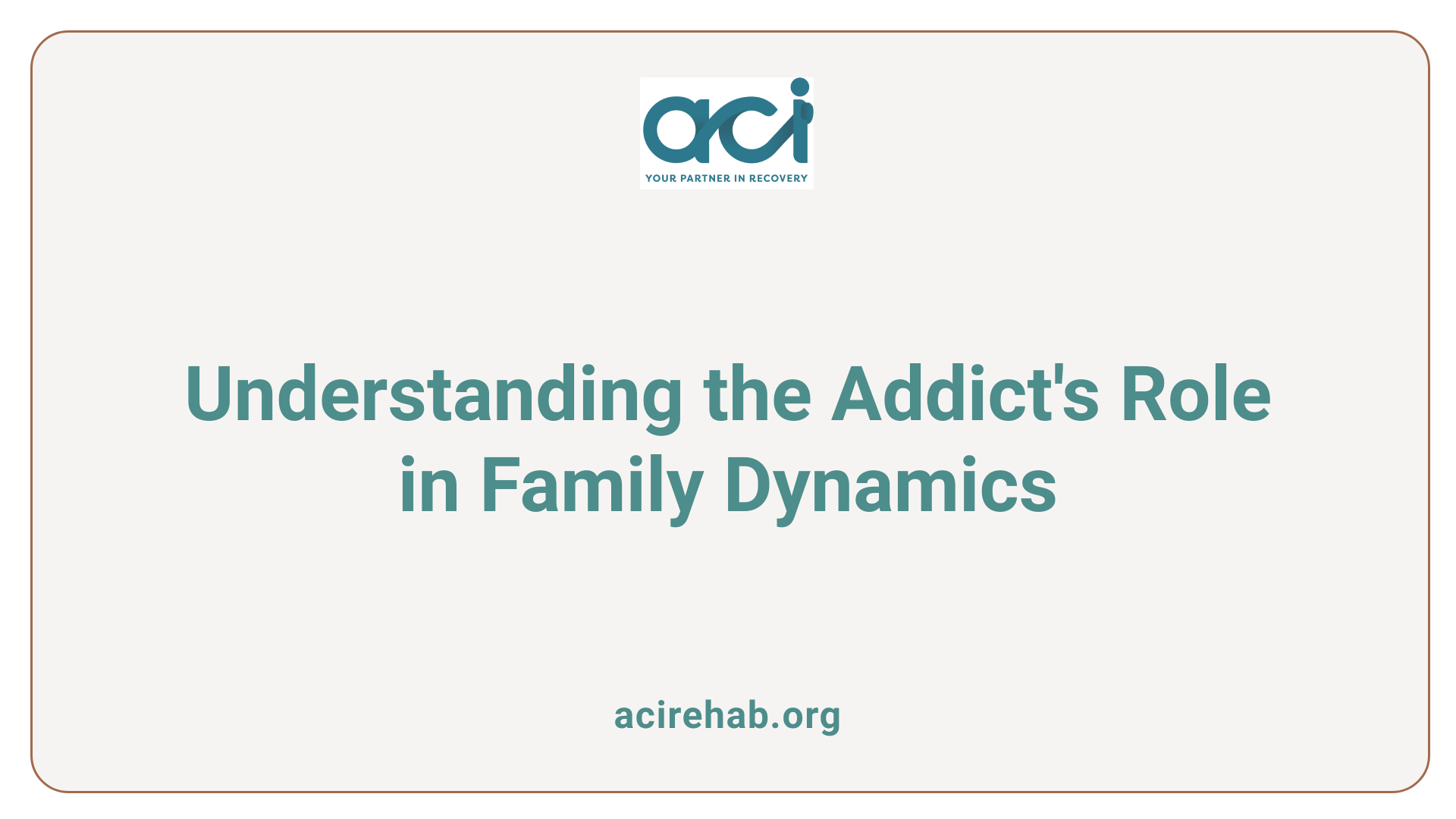
Behaviors Exhibited by the Addict
The addict often becomes the focal point of family life, displaying behaviors such as dependency on substances, emotional volatility, and manipulation. Their pursuit of drugs or alcohol can overshadow familial interactions, leading to conflict and mistrust. This constant need for substance use not only affects their decision-making but also their responsibility towards family obligations. Many times, the addict lies to cover up their substance abuse, complicating relationships within the family unit and perpetuating an environment of deceit.
Impact on Family Dynamics
As addiction escalates, the family unit typically undergoes significant changes in roles and responsibilities. Family members may start to enable the addict’s behavior, inadvertently supporting their cycle of addiction by avoiding confrontation or making excuses for them. The overall environment can become chaotic, with family members feeling as though they are walking on eggshells, which increases stress and frustration. Children, in particular, might adopt roles such as the Hero, who tries to maintain a sense of normalcy, or the Scapegoat, who may act out to divert attention from the addict’s issues.
Centrality of the Addict’s Role
The addict’s role is central to the family dynamic: their actions and choices have profound ripple effects. Recovery for the addict is crucial, not only for their own well-being but also for the restoration of family harmony. However, everyone in the family may develop coping mechanisms that complicate recovery efforts. Recognition of the roles played by each member—such as the Caretaker, the Lost Child, and others—can facilitate a path toward healing. Understanding these dynamics allows families to seek appropriate support, such as family therapy, which can enhance communication and foster a healthier recovery environment.
General Roles in Families Dealing with Addiction
Wegscheider-Cruse identified six general roles that family members typically adopt when dealing with addiction: the Addict, the Caretaker/Enabler, the Hero, the Scapegoat, the Lost Child, and the Mascot. Each of these roles serves a different function within the family dynamic, often unconsciously taken on to cope with the chaos and stress resulting from a loved one’s substance use disorder. The Caretaker/Enabler often exacerbates the situation by shielding the addict from the consequences of their actions, which can impede recovery efforts. These roles can significantly affect the overall family dynamics and the addicted individual’s ability to achieve lasting recovery. Engaging in family therapy can help improve communication and support among family members, fostering a healthier environment for recovery.
2. The Enabler: Sustaining the Cycle of Denial
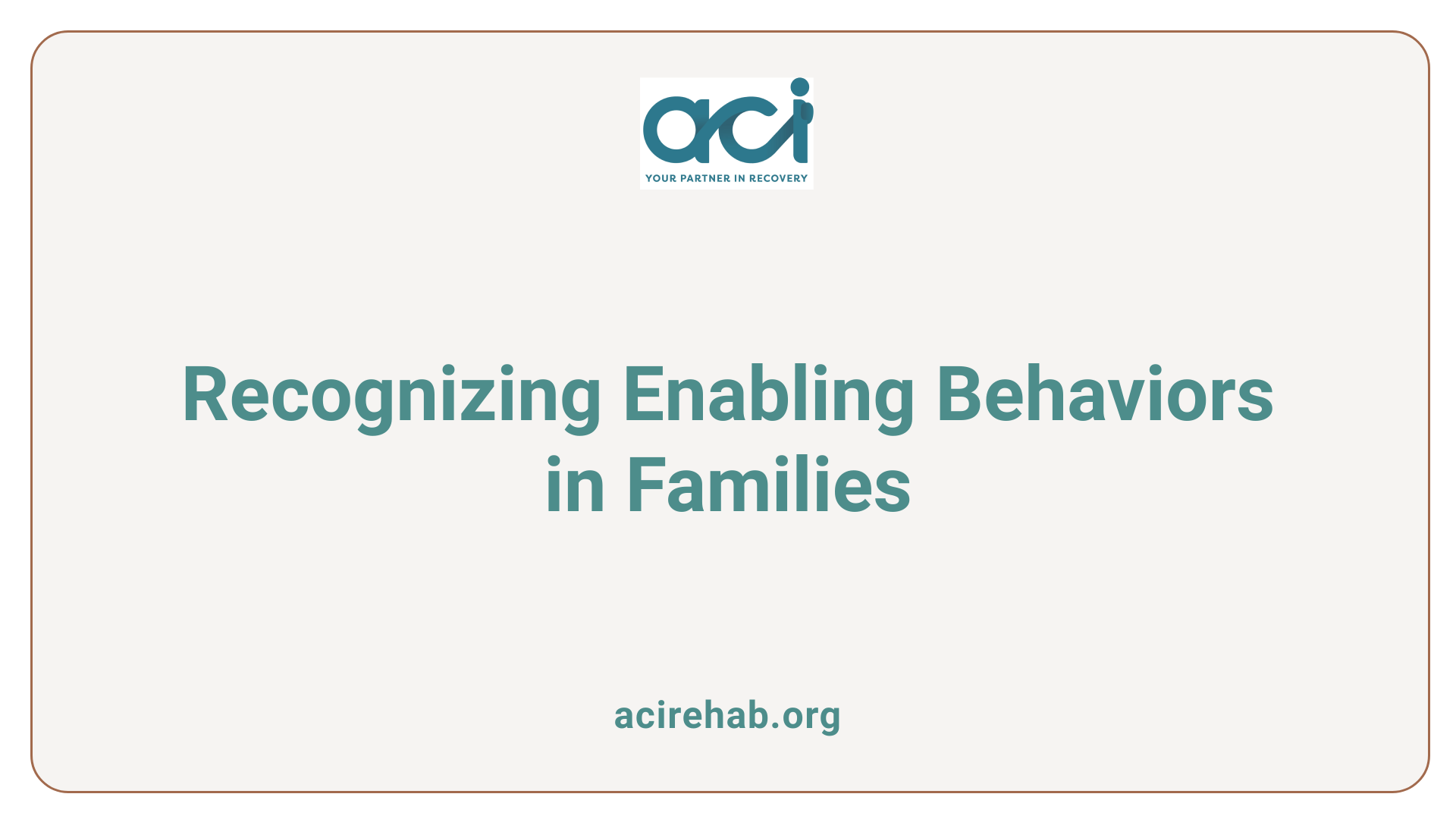
Characteristics of the Enabler
The Enabler, often known as the Caretaker, plays a critical role in the family dynamic surrounding addiction. This individual typically exhibits the following behaviors:
- Denial: They may downplay the seriousness of the addict’s behavior, convincing themselves and others that the problem isn’t as severe as it appears.
- Excuse-making: Enablers often make excuses for the addict, covering up their mistakes or avoiding discussion about their addiction.
- Avoiding Conflict: They strive to maintain peace in the household by sidestepping confrontations and denying any issues related to substance use.
- Taking on Responsibilities: The Enabler frequently assumes the responsibilities of the addict, effectively taking care of the household and compensating for the addict’s neglect of duties.
Consequences of Enabling Behavior
The actions of an Enabler can have significant negative repercussions, both for themselves and the addicted family member:
- Perpetuating Addiction: By shielding the addict from facing the consequences of their behavior, an Enabler inadvertently supports the continuation of the addiction cycle.
- Emotional Toll: The constant need to cover for the addict can lead to significant stress, anxiety, and burnout for the Enabler.
- Neglecting Self-Care: They often neglect their own needs and emotional health, leading to deteriorating mental well-being and possible resentment towards the addict.
Role in Family Dynamics
Within the family structure, the Enabler helps to perpetuate a dysfunctional cycle:
- Shifts Focus: Their actions can divert attention away from the addict’s issues, preventing the family from addressing the crucial need for recovery and healing.
- Disrupted Boundaries: The Enabler’s inability to set boundaries can create an environment of chaos, where the addiction goes unchecked and the family struggles to cope.
- Impact on Relationships: Enabling behavior can strain not only the relationship with the addict but also with other family members, as the dynamics become increasingly complex and intertwined with denial and dysfunction.
By understanding the Enabler’s role, families can begin to recognize these patterns and work towards healthier responses and recovery strategies.
3. The Hero: Perfectionism and Pressure
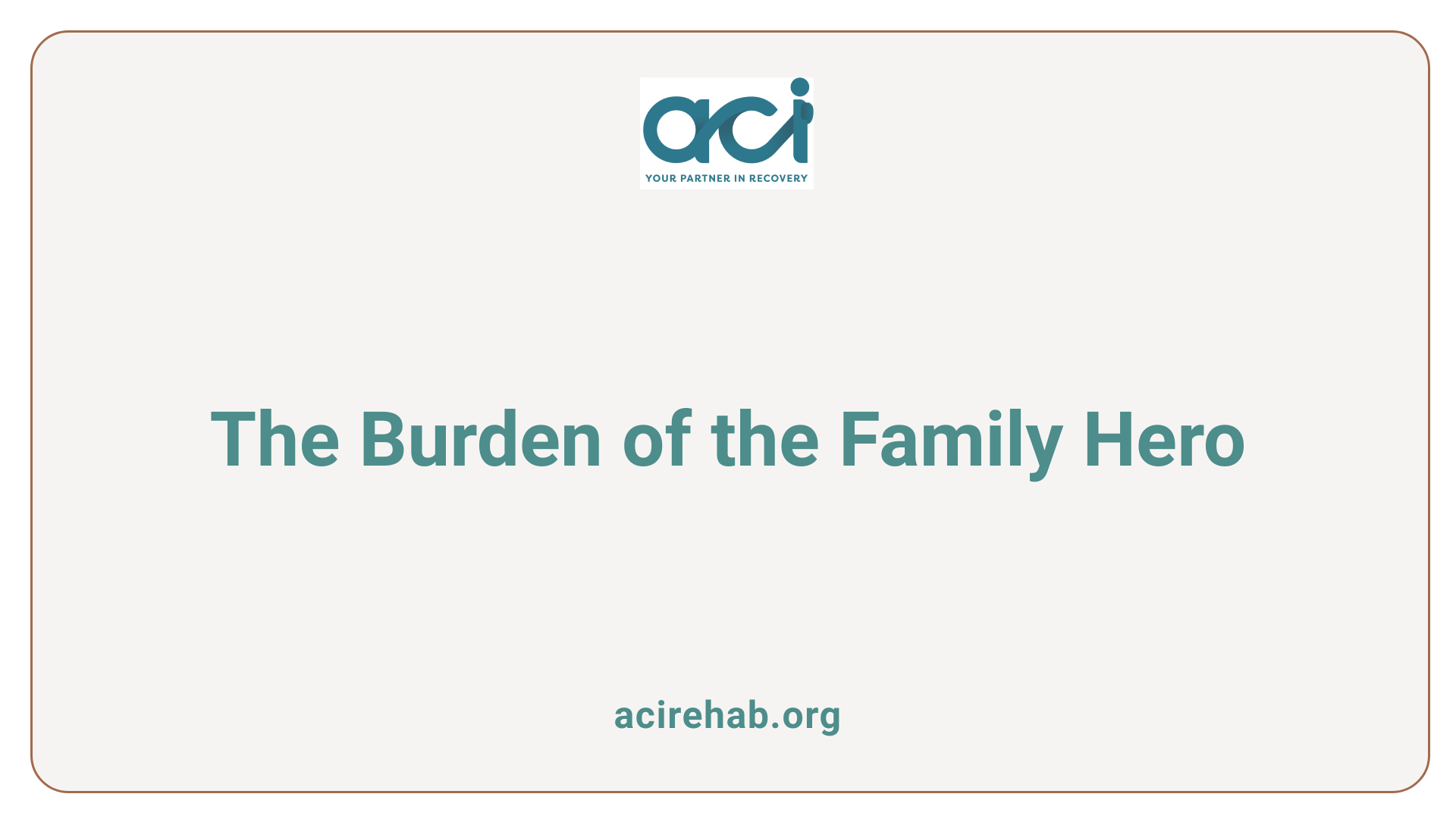
Hero as the Overachiever
The Hero is often the eldest child in a family affected by addiction. This individual typically steps into the role of caretaker, striving to maintain family stability and improve the family image. The Hero displays overachievement, pushing themselves to excel academically, socially, and in extracurricular activities. They take on excessive responsibilities, which can manifest as a deep-seated perfectionism.
In many cases, this quest for control and normalcy stems from the chaotic environment that addiction creates. The Hero feels a strong need to compensate for the instability brought on by the addicted family member’s behaviors, which can include substance use and related crises.
Effects of the Hero Role on Family and Self
While the Hero attempts to foster a sense of normalcy, this role also carries significant emotional burdens. The responsibility to uphold the family’s reputation often leads to chronic stress and anxiety. Many Heroes find themselves living in fear of failure and criticism, which can result in feelings of inadequacy and exhaustion.
Moreover, while the Hero focuses on maintaining family harmony, their personal needs and mental health become secondary. This situation can foster resentment, and Heroes may struggle with feelings of isolation as they prioritize others over themselves. Ultimately, their role can distract from dealing with the addiction issues directly, complicating both personal fulfillment and family healing.
Integration of Hero in Recovery Efforts
In recovery efforts, the Hero’s role can be both a challenge and a resource. If the Hero can recognize their role and the associated pressures, they can channel their strengths toward supporting the addict’s recovery journey. This might mean setting healthy boundaries, advocating for support groups, or engaging in family counseling where their voice can be heard. By moving beyond perfectionism and embracing vulnerability, Heroes have the potential to transform their energy into a positive force for change within the family.
This can create an environment where genuine healing takes place, allowing them to support both their own needs and those of their loved ones.
4. The Scapegoat: A Target for Blame
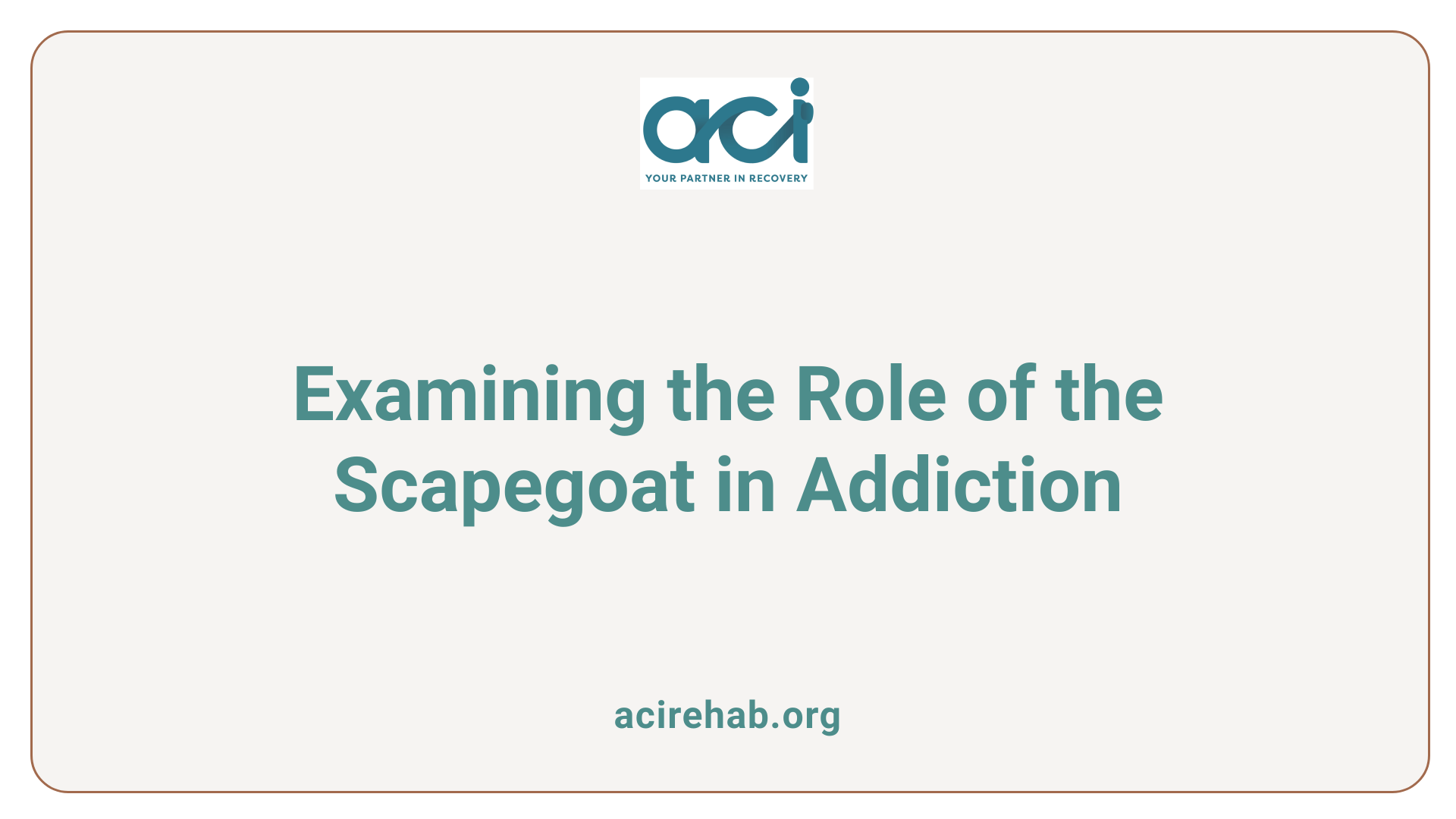
Scapegoat’s Behavior and Family Role
In families dealing with addiction, the scapegoat often becomes a central figure who bears the blame for various issues, despite being a victim of the family’s chaotic dynamics. Typically positioned as the middle child, this individual often acts out—engaging in rebellious behaviors or emotional outbursts—in an attempt to divert attention away from the addict’s substance abuse. While the scapegoat may seem troublesome to others, they often take these actions as a means to cope with feelings of neglect and frustration stemming from their family’s turmoil.
Diversion of Attention from Addiction
The scapegoat’s behavior is not simply rebellious; it serves a deeper purpose of shifting the focus from the addiction problems onto them. Instead of confronting the underlying issues related to the addict’s behavior, family members may choose to blame the scapegoat for disgracing the family. This dynamic not only allows the addict to escape responsibility but also creates a cycle of conflict that perpetuates family dysfunction. As a result, significant issues connected to addiction remain unaddressed, leading to a lack of discernible progress in recovery.
Emotional Consequences of Being a Scapegoat
The emotional repercussions of being labeled as the scapegoat can be substantial. Individuals in this role may experience feelings of inadequacy, shame, and guilt, often internalizing the belief that they are the root of the family’s problems. Over time, these persistent feelings can lead to a distorted self-image, strained relationships, and even emotional distress that may manifest as anxiety or depression. Even as they draw attention away from the addict, the scapegoat often feels isolated, exacerbated by the lack of support from family members who may still focus on the immediate chaos caused by addiction.
| Role | Key Behaviors | Emotional Impact |
|---|---|---|
| Scapegoat | Acts out, diverts focus | Feelings of shame, guilt |
| Family Members | Blame scapegoat for problems | Lack of understanding and support |
| Addict | The source of family’s chaos | Avoided confrontation |
5. The Lost Child: Silence and Withdrawal
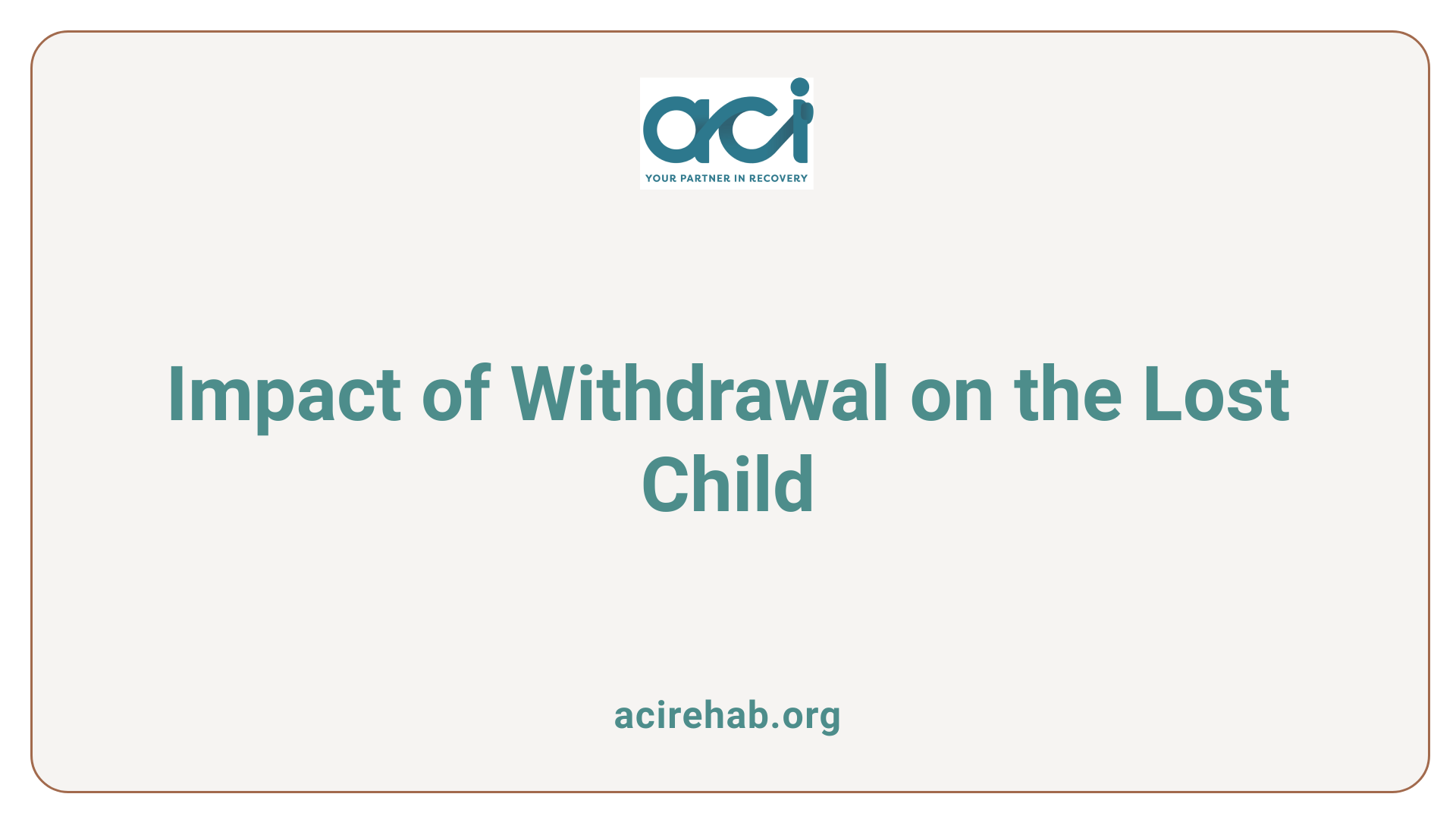
Characteristics of the Lost Child
The Lost Child in a family affected by addiction often appears invisible, quietly withdrawing from family interactions. This individual may shy away from emotional discussions, preferring solitude over confrontation. Typically, they may exhibit behaviors such as retreating into books or hobbies, avoiding social gatherings, and expressing themselves less frequently within the family context. Their habitual silence often leads to feelings of neglect, as their emotional needs are overlooked during the family’s chaotic dynamics.
Impact of Withdrawal on Individual Development
This isolation can profoundly affect the Lost Child’s development. Lacking attention and emotional support, they may struggle to build lasting relationships and navigate social situations effectively. The absence of family engagement can lead to low self-esteem and a feeling of inadequacy. Over time, the Lost Child may internalize feelings of guilt and blame for not being more vocal about their needs, which can impact their mental health negatively, fostering anxiety or depression.
Coping Mechanisms of the Lost Child
To cope with their environment, the Lost Child often develops strategies aimed at self-preservation. These may include:
- Avoidance: They minimize interactions to escape the chaos of addiction, making it easier to stay out of conflict.
- Fantasy: Some may create imaginary worlds or engage in daydreaming as a means of coping with feelings of loneliness and neglect.
- Self-Sufficiency: By fostering independence from the family unit, the Lost Child often learns to take care of their own emotional needs, but this can foster a deep-seated sense of isolation.
In summary, the role of the Lost Child in an addicted family exhibits profound implications, shaping their identity and coping mechanisms while masking their deeper emotional struggles. Their path to healing may require recognizing and vocalizing their needs, which have been stifled for so long.
6. The Mascot: Humor as a Shield
What is the Mascot’s Use of Humor as Coping?
The Mascot emerges as a humorous individual within the family, often taking on the role of the jester. This family member uses wit and jokes to lighten the atmosphere, providing comic relief in the face of the serious issues presented by addiction.
Humor becomes a defense mechanism for the Mascot, allowing them to navigate through uncomfortable and emotionally charged situations without directly confronting the underlying issues. This behavior stems from a desire to maintain peace and avoid conflict, creating a temporary distraction from the turmoil that addiction brings.
How Does the Mascot Role in Diffusing Family Tensions?
While the Mascot may temporarily ease tensions with their light-hearted antics, this can sometimes trivialize the gravity of the addiction problem. By redirecting focus onto humor, they may unknowingly inhibit open discussions about the addiction, which are vital for recovery and healing.
In many situations, the Mascot’s jokes can diffuse hostility and help maintain an air of normalcy, but this approach may only serve to perpetuate the family’s denial of the severity of the addiction issues at hand.
What are the Hidden Struggles of the Mascot?
Beneath the surface, the Mascot often grapples with significant emotional pain and insecurity. Their reliance on humor can lead to feelings of inadequacy, particularly if they believe their humor is the only contribution they can make to the family.
Over time, these hidden struggles might manifest as coping issues, including potential substance use themselves as they attempt to manage their unexpressed emotions and fears. Thus, while the Mascot plays an important role in family dynamics, their coping strategy may mask deeper emotional challenges that need to be addressed for genuine healing to occur.
Family and Peer Influence on Drug Abuse
What roles do family and peer groups play in drug abuse?
Family and peer groups significantly influence drug abuse among adolescents. These influences can either contribute to or deter initiation and maintenance of substance use. In families where substance use is present, children often observe and adopt similar behaviors, leading many to view drug use as normalized. This dynamic is further complicated by the roles that family members take on in response to addiction, such as the Addict, Enabler, Hero, Scapegoat, Mascot, and Lost Child.
Key Family Roles
| Role | Behavior | Impact on Family Dynamics |
|---|---|---|
| Addict | Prioritizes substance use, causing chaos | Centers family conflict around addiction |
| Enabler | Denies severity of addiction, makes excuses | Perpetuates addiction cycle, complicating recovery |
| Hero | Attempts to maintain normalcy, perfectionist | Adds pressure to perform, can lead to stress |
| Scapegoat | Acts out, redirects attention from the addict | Faces blame and criticism, develops low self-esteem |
| Mascot | Uses humor to deflect tension | Masks deeper feelings, prevents serious conversations |
| Lost Child | Withdraws and avoids conflict | Often feels isolated, struggles with relationships |
How does family behavior affect drug abuse?
Familial behavior, especially parental actions or attitudes towards substance use, plays a crucial role in shaping adolescents’ choices regarding drugs. Adolescents are more prone to engage in drug use when living in environments where family members exhibit drug-seeking behaviors. Such households often promote unhealthy coping mechanisms; the Enabler, for instance, may shield the Addict from consequences, allowing substance abuse to persist unchallenged.
The role of environmental factors
External factors, including peer groups and community environment, exacerbate the issues created within families. Peers are often sources of substances and can normalize drug use behaviors among young individuals. Thus, the combination of family dynamics and peer influence shapes the likelihood of drug abuse, emphasizing the need for a supportive family environment and positive peer relationships in combating substance use among adolescents.
The Role of Family in Addiction Recovery
How do family members contribute to the recovery of an addicted individual?
Family members play a crucial role in the recovery of someone struggling with addiction. They provide emotional support, which is vital during treatment and rehabilitation. Here are several ways family members can contribute:
-
Establish Supportive Roles: Each family member can adopt specific supportive functions such as the Encourager, Educator, or Listener. These roles foster communication and emotional expression, creating a nurturing environment for recovery.
-
Involvement in Therapy: Participation in family therapy is beneficial. It allows family members to confront the complexities of addiction together, helping to mend strained relationships and rebuild trust.
-
Setting Boundaries: Family members must learn to set healthy boundaries, which is essential for both their well-being and that of the addict. This often helps in holding the addicted individual accountable for their actions, facilitating personal responsibility.
-
Promoting Accountability: Encouraging the addict to take responsibility for their behavior can motivate change. Support networks should actively engage in discussions about accountability without assigning blame.
-
Celebrating Progress: Recognizing and celebrating milestones in recovery strengthens the individual’s resolve and reinforces the family’s commitment to recovery.
However, maintaining these roles can be challenging due to the emotional turmoil that addiction causes. Family dynamics can often become tense, requiring education and open communication to navigate effectively.
What are the benefits of family therapy in addiction recovery?
Family therapy offers numerous benefits in addiction recovery, including:
- Improved Communication: Therapy provides a structured setting for family members to express feelings and thoughts constructively.
- Healing Relationships: It can help mend broken connections, allowing a healthier family structure to emerge.
- Shared Understanding: Family members learn more about addiction, which fosters empathy and compassion among them.
- Collaborative Strategies: Families develop joint strategies to support the addicted member, making the recovery process more cohesive.
Impact of family involvement on recovery
Research shows a direct correlation between family involvement and successful recovery outcomes. Key findings include:
| Benefit | Description | Impact on Recovery |
|---|---|---|
| Enhances Sobriety Rates | Supportive families help maintain long-term sobriety | Higher likelihood of sustained recovery |
| Reduces Relapse Likelihood | Active involvement decreases chances of relapse | Increased recovery stability |
| Builds Resilience | Emotional support fortifies the individual’s coping capacity | Stronger response to stressors |
In conclusion, the collective involvement of family members—in understanding addiction and fostering a supportive environment—is paramount to the recovery journey. Their active participation not only aids the addicted individual but also promotes healing within the family unit.
Prevention of Drug Abuse through Family Dynamics
What are the roles of family members in the prevention of drug abuse?
Family dynamics significantly impact the success of drug abuse prevention efforts. Different roles can either foster a supportive environment or perpetuate cycles of addiction. Understanding these roles is crucial for effective prevention strategies.
The Addict
The individual grappling with addiction is often at the center of family dynamics. Their behaviors can lead to disruptive patterns, causing family members to adopt different coping mechanisms. Recognizing the addict’s need for help is vital, but equally important is the family’s recognition of their own roles and responsibilities in addressing the addiction.
The Caretaker (Enabler)
Often, a family member assumes the caretaker role, mistakenly believing they are providing support when they are actually enabling the addiction. This includes making excuses for the addict’s behavior and avoiding necessary conflicts. To prevent drug abuse, family members need to establish healthy boundaries that don’t shield the addict from consequences.
The Hero
The hero position, usually taken by the eldest child, tries to maintain an image of control and success. This often leads to pressure and anxiety. Understanding that reaching out for help is a sign of strength, rather than weakness, is essential for families to break free from this dynamic.
The Scapegoat
Frequently, the scapegoat is blamed for family troubles, allowing the family to avoid addressing the addiction. This misguided focus on a designated problem child can detract from finding solutions to the real issues at hand.
The Mascot and Lost Child
The mascot uses humor, often inappropriately, to deflect from tense situations. Conversely, the lost child withdraws and avoids conflict. Both roles can lead to long-term emotional detachment, hindering effective communication about addiction and recovery.
Education on Addiction
Educating family members about the implications of addiction can reshape these roles. Training in recognizing the signs of substance abuse allows families to intervene early, adjusting their dynamics to support recovery and prevention effectively.
Role of Denial and Mental Health Challenges
Denial within the family can severely restrict efforts to combat drug abuse. When family members downplay or deny the addiction, they inadvertently contribute to a toxic environment that fuels substance use. Addressing their own mental health challenges, such as anxiety or depression, can enable family members to better support one another while engaging with the addict’s recovery process.
By fostering trust, setting appropriate boundaries, educating themselves, and addressing denial, families create a framework for healthier relationships that deter drug abuse.
The Influence of Family Dynamics on Addiction Behavior
How do family dynamics impact the behavior of an addicted family member and the recovery process?
Family dynamics exert a significant influence on both the behavior of an addicted individual and the recovery process. Addiction tends to create a ripple effect, leading to relational conflicts, financial difficulties, and emotional instability that can further fuel substance use.
Dysfunctional and Supportive Roles
Within these family structures, certain roles may crystallize, complicating the recovery journey:
- The Addict: Central to the familial turmoil, the addict often manipulates those around them, ignoring the emotional and psychological damage inflicted.
- The Enabler (Caretaker): This family member often allows the addiction to flourish by making excuses, which prevents the addict from facing consequences. Their lack of boundaries exacerbates the addiction, making healing more challenging.
- The Hero: Typically the firstborn, this person takes on excessive responsibilities in a bid to create family stability, often leading to stress and perfectionism. While well-intentioned, their role may distract from the real issue at hand—the addiction itself.
- The Scapegoat: Frequently blamed for family issues, this person may engage in rebellion or self-destructive behaviors, which subsequently shifts the focus away from the addict.
- The Mascot: Using humor as a defense mechanism, the mascot attempts to lighten the mood but may inadvertently minimize the seriousness of the situation, impeding effective communication about the addiction.
- The Lost Child: Often overlooked, this member withdraws from family dynamics, feeling isolated and emotionally distanced from the chaos surrounding addiction.
The Importance of Family Intervention
A supportive family environment plays a pivotal role in facilitating recovery. Healthy dynamics foster:
- Open Communication: Encouraging honest discussions about feelings can promote accountability and transparency.
- Emotional Support: Family members who actively listen and validate each other’s experiences can help the addict feel less isolated.
- Motivation for Change: Recognizing and celebrating small milestones in the recovery journey can bolster the addict’s resolve.
Effective interventions must include family participation, highlighting the need for awareness about the roles family members play. This collective involvement is essential for reshaping family dynamics and promoting sustained recovery.
Conclusion
Understanding the six common roles within families affected by addiction sheds light on how these dynamics influence both the addicted individual and the entire family. Recognizing these roles allows family members to consciously alter maladaptive patterns and contribute positively to recovery efforts. Engaging in therapy and fostering open communication can transform these roles from burdens to supportive actions, ultimately allowing all family members to heal and thrive. This insight is crucial for both personal recovery and maintaining healthier family relationships.
References
- The Six Types of Family Roles in Addictive Households
- [PDF] ROLES IN ADDICTION
- Take Warning of These 6 Family Roles in Addiction
- The 6 Family Roles in Addiction – Georgetown Behavioral Hospital
- Family Roles in Addiction and How Everyone Gets Hurt | EHN Canada
- How Addiction Impacts the Family: 6 Family Roles in a Dysfunctional …
- The Six Key Roles Of Family Members In Addiction Recovery

